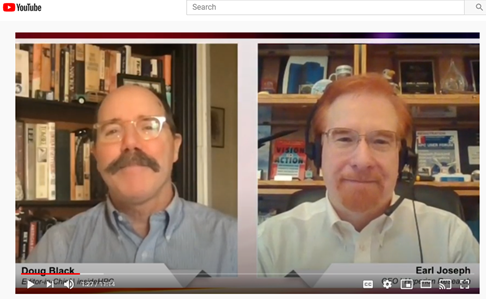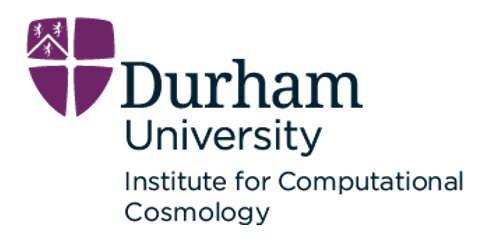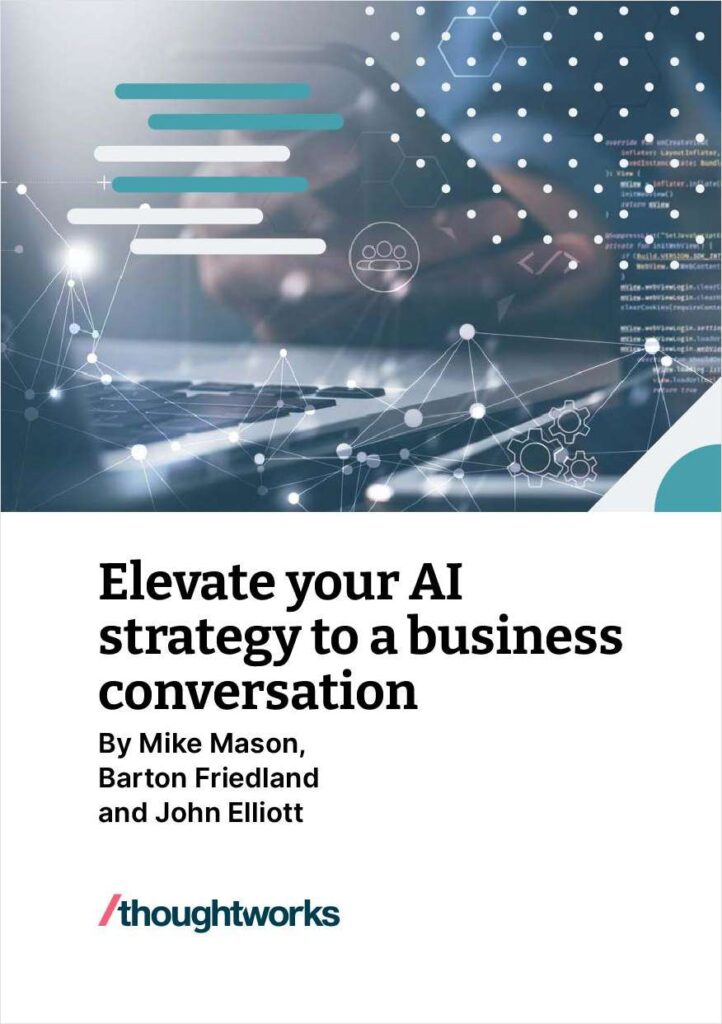Earl Joseph, CEO of HPC industry analyst firm Hyperion Research, has been working in and scrutinizing HPC for decades, first on the vendor side and later as the leader of an analyst group at International Data Corp. that became Hyperion. Here, Joseph explains the how and why of the Hyperion spin-off as well as the company’s international research methodology. He also discusses big changes impacting HPC and his major concerns for the industry (they’re closely tied), the growing global reliance on HPC to solve “national problems,” and the great potential of emerging technology combinations: exascale-class compute driving AI applications with quantum, possibly, taking on parts of the workload.
In This Update…. from the HPC User Forum Steering Committee
by Thomas Gerard and Bob Sorensen
After the global pandemic forced Hyperion Research to cancel the 2020 HPC User Forums, we decided to reach out to the HPC community in another way — by publishing a series of interviews with members of the HPC User Forum Steering Committee. Our hope is that these seasoned leaders’ perspectives on HPC’s past, present and future will be interesting and beneficial to others. To conduct the interviews, Hyperion Research engaged insideHPC Media. We welcome comments and questions addressed to Steve Conway, sconway@hyperionres.com or Earl Joseph, ejoseph@hyperionres.com.
This interview is with Earl Joseph, CEO of Hyperion Research and Executive Director of the HPC User Forum. He has 36 years of experience in the computer industry with a focus on technical computing and high performance computing. He conducts research and provides consulting within the United States, European and Asia-Pacific markets for technical servers, supercomputers, clouds, visualization and clustering. This research includes market sizing, market share analysis, forecasts, technology assessment, and vendor analysis. Earlier, Joseph led marketing and strategic planning functions for four major U.S. corporations; Cray, UNISYS, SGI and Concurrent. He provided research and recommendations contributing to the renewed emphasis on supercomputing in the U.S. President’s 2006 state-of-the-union address. Joseph earned a Ph.D. in the strategic management of high technology companies from the University of Minnesota.
The HPC User Forum was established in 1999 to promote the health of the global HPC industry and address issues of common concern to users. More than 75 HPC User Forum meetings have been held in the Americas, Europe and the Asia-Pacific region since the organization’s founding in 2000.
Doug Black: Hi, I’m Doug Black, editor-in-chief of insideHPC and today, as part of our Hyperion Research series of interviews, we have no less than Hyperion’s CEO, Earl Joseph. Earl, welcome.
Earl Joseph: Thank you very much.
Black: I thought we could just start off with you refreshing our memory about the history of Hyperion Research and leaving IDC to become an independent industry analyst firm.
Joseph: This group was originally part of IDC for over 30 years. At IDC we did various market research services, trying our best to track everything related to HPC, sold every quarter, and following all new technologies. Then IDC was sold to a foreign owner and because we do a lot of projects for the US government and a lot of things to support R&D for US industry, we weren’t allowed to be under foreign ownership. That was the motivator for us spinning off almost four years ago. When we spun off, we were fortunate in that IDC had to give us all the IP related to high performance computing, all the research documents; our entire footprint had to be removed from IDC. It was kind of a fascinating process to go through.
Black: Could you give us a profile of Hyperion Research and your unique strategic methodology?
Joseph: One fortunate aspect is that we brought with us most of the approach that we used at IDC and that made our life a lot easier as far as trying to design a company. First of all, we tried to study what’s going on in the world at a given point in time. What I mean by that is in a given year we do many thousands of individual survey interviews. We’re interviewing the community, the vendors, the suppliers, and we try to really understand all the dynamics. As I mentioned, we try to track everything sold, but in every technology area we also maintain five-year forecasts in each area. The fun part of the job is that we get to work with all the different HPC organizations around the world. We spend about half our time with users and half the time with vendors, including helping various governments develop their HPC plans, strategies, and their approach to the world.
The other thing we get involved with a lot is trying to justify the purchase of supercomputers. As you know, the cost of a supercomputer has grown dramatically, so the approval process is much more complex than it has been in the past.
Black: I’m sure that that’s a huge effort on that score. Within your overall knowledge of HPC, what are the particular areas that you focus on individually?
Joseph: Fortunately, as CEO I get involved in all the projects we’re doing, but my major involvement is with the different government organizations around the world: the intelligence communities, the military is also on that portion. Also, because I have a mechanical engineering background, I am involved a lot in the manufacturing sectors of the business.
I get heavily involved in the design of our studies, ensuring the quality, helping formulate the design of the surveys, and then a lot of around the numbers. In order for us to do all the studies we do (in a given year we are doing on the order of 25 to 30 custom studies) there is also all the base work we have to do. For example, we have to publish over 100 documents a year on all different topics, so I spend a lot of my time trying to do quality control to make sure everything’s consistent, that all the things tie together. In the past, when we would do four or five studies a year, it was pretty easy to keep all of that in memory. I have to tell you, with 25-30 separate studies a year, you have to constantly look up to make sure “does this number tie back with this study or how has it changed?” The dynamics are just unbelievable right now. For example, in cloud computing, we do about 10 studies a year. On AI we are doing six or seven separate studies a year because it’s just changing so quickly. That’s the fun part that I enjoy.
Black: Cloud HPC, of course, is exploding, as you’ve been reporting. Looking back over the last five or 10 years, what are the biggest changes in HPC that you’d say have had the most impact?
Joseph: The ones that have had the most impact is using HPC to solve what I’ll call national problems; for example, to make countries more innovative. We’ve gone through some difficult economic times if I look back a little more than five years, maybe eight to 10. A lot of countries have decided that to get out of the economic doldrums or problems as a nation you have to be more innovative, you have to be more competitive, and you have to protect your manufacturing by being competitive, so these countries are using HPC to address those really large national problems. In order to do that means instead of having just one giant supercomputer that you can brag about each country needs multiple computers that are tailored for each one of their needs. That’s a major trend that we’re seeing.
The second trend that we’re seeing that is somewhat related, is that the value is so high people are spending a lot more per supercomputer. If you think back 15-20 years ago, for $35 million you could buy the largest computer in the world or be in the running for that. Then it moved to $100 million fairly quickly. Now, we are in a zone where you have to spend between $200-300 million to have the largest machine, and in just a year or two that’s going to be $500-600 million. So, you think of Moore’s law, the speedup of processors, then you add that to the scaling of having a lot more in a system, and then when you scale your budget at the rate I just described, the power of the systems are growing dramatically.
It’s amazing what can be done. The exciting part to me is when you take the traditional HPC technology, you add big data, AI with its machine learning, deep learning, graph analytics – the new abilities to discover new things is growing dramatically and that is exciting to me.
Black: Where do you think HPC is headed? Are there trends that have you particularly excited or concerned as we move forward?
Joseph: I addressed the biggest concern, which is the cost of the systems. The exciting part to me is all the new technologies. I mentioned some of the AI ones but also quantum computing, new types of processors. We are tracking, right now, over 200 different new processors and related hardware and software technologies. A lot of them are highly specialized processors. But if you think of what a system could look like in four or five years, you may have a quantum computer or maybe a couple of them doing some part of the task. You could be acquiring massive data sets and then you could have massive exascale machines doing a lot of the processing.
The interesting thing to me is when these technologies really come on board (I’m not saying AI isn’t onboard right now, I’m referring to when AI becomes more pervasive and uses gigantic data sets that might be 10,000x larger than today with a lot more quality) we may be talking about HPC systems that are in the tens of billions of dollars when you talk about the whole data center. If quantum computing works, would you only buy one? You might want to buy two or three of them. If your data sets are great you may require just massive storage farms. I think the exciting trend on the horizon is the trend of the increase in size; the increase in science accomplished is going to continue to accelerate. Along with that, in the shorter term, just adding big data with AI/machine learning/deep learning to HPC and combining the two together I think will accelerate science and create, perhaps, a whole new category of research.
Black: Exciting stuff. Tell us, how did you get involved in HPC in the first place? Can you summarize your background in the industry?
Joseph: It actually started when I was quite young. My father was a computer architect at ERA and that turned into UNIVAC. As a child he was always giving us puzzles, problems to solve, and at dinner he would talk about the latest computer technology and the new developments going on. At the University of Minnesota my PhD research was in the strategic management of high technology. At that time I was uncertain if I was going to go in the computer industry because my father was very strong in that sector, and then I did decide that that was the path to go. So, when I graduated, I started at Sperry UNIVAC, which was a really interesting job. It was good for me to start with a very large company because you saw all the different problems, all the pieces needed to make something successful. I was fortunate to be in the development organization and actually running a simulator that simulated all 200 different product lines that the company had. Back in those mainframe days, a mainframe company not only made the computer, they made the terminals and the wires that connected it. The fun thing was, Sperry, before the days of the internet, actually had its own satellite system. It was called Sperry Link. That’s how they did their communication around the world in the systems.
Then in the later 1980’s I joined Cray Research. If I can tell you a fun story, when I was doing my interview at Cray I was interviewing with Ed Macy. It was over lunch, and he was definitely a salesperson by background, and by about the middle of lunch I realized he’s about to give me a sales pitch, and I thought that I was going to really like it. His sales pitch was basically, “let me tell you about Cray. This is where you find Cray computers.” And he went through a list of all the advanced research in the world – what’s going on at CERN, the best weather forecasting, the best car design. I was into the HPC industry full time at that point. At Sperry I did some things with the scientific processors, but it was really when I joined Cray in the late 80’s that I was fully in HPC. So, that’s really how I became one of the HPC folks and joined the community.
Black: That’s a great story. I actually knew Ed Macy back when he went over to Intel to run their supercomputer systems division.
Joseph: Excellent!
Black: Is there anything else we didn’t cover that you’d like to add?
Joseph: I’d like to thank you very much and insideHPC for doing the video series, we really appreciate that. One very important thing I’d like to mention is I loved working with Rich Brueckner. He really was a star and a really, truly thoughtful, kind person. An enjoyable person to be around all the time and we really, deeply miss him. We’re sorry to see him pass away this year.
Black: We miss him very much and, certainly, at the conferences and his overall presence. Thanks very much for that, Earl, and thanks so much for your time today.




